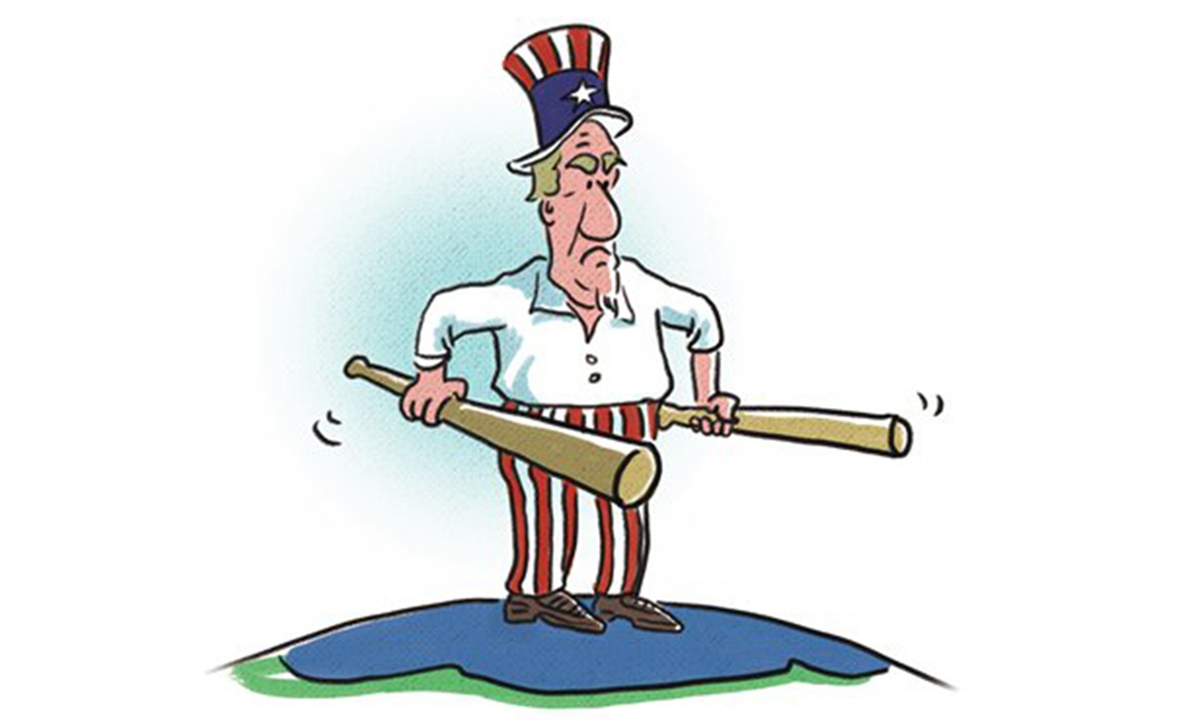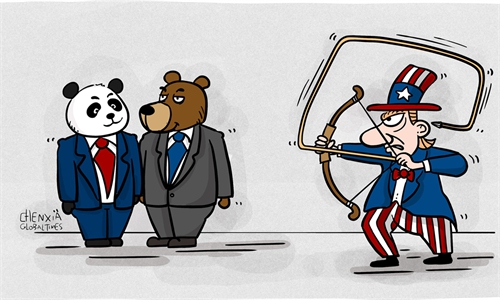
US hegemony Illustration: Liu Rui/GT
Last week, US House Speaker Nancy Pelosi made a reckless visit to the island of Taiwan, disregarding warnings from the Chinese mainland. Meanwhile, the military conflict between Russia and Ukraine has entered the sixth month, and the US-provoked Ukraine crisis is not seeing any sign of de-escalation. Some believe just as the US wants to use the Ukraine crisis to deplete Russia's power, it also intends to use the Taiwan question to contain China.Right now, we can see that the US doesn't want the situation to be stabilized both in the Ukraine crisis and over the Taiwan question. I understand that both questions have a completely different nature and history. But the approach of the US is the same. Washington's main idea is to deregulate the balance of the situation both in Europe and the Asia-Pacific, to crash normal trading relations and financial markets, and in this way to push down the Renminbi level and raise the level of the US dollar. That is also one of the ideas behind why the US is provoking a conflict in the Taiwan Straits.
As the Russia-Ukraine crisis goes on, no one predicted such a situation to occur. According to the Western media, Russia believed that the operation should be ended in three days or one week. At the same time, many European countries also thought that Russia would lose in just one week. So no one was correct, and it means the situation is changing drastically for all countries involved, none of which was prepared for this situation.
The European Union also was completely unprepared for this situation. For example, we can see the huge problem with gas and oil supply, because Europe was dependent on Russia. It wanted to put sanctions against Russia, but at the same time, keep the same supply of gas and oil in this way to maintain the normal way of life in Europe. And it's impossible right now. If you're engaged in a battle, you should understand that you can lose it too.
Currently, some European companies are trying to reconsider their approach to Russia. Many have started to renew the negotiations with Russia and want to come back to the Russian market, because it's impossible to live without Russia. It's not because Russia is so great. It's because the modern world is interconnected. The modern world is created by trade relations, not by war.
The Russia-Ukraine military conflict and the current tensions in the Taiwan Straits caused by Pelosi's provocation have dimmed the prospect of forming the China-US-Russia triangle. Theoretically, this triangle is possible because we have a lot of common challenges, for example, a pandemic like COVID-19 and many problems in space exploration. Thus, we have a lot of common things to do.
Despite warnings from politicians, such as the very wise former US secretary of state Henry Kissinger, that the US should not be an enemy of both China and Russia, Washington seems to be set on the path of confronting both countries. Just look at the modern generation of present-day US politicians - their intellectual level is much lower than that of Kissinger or, for example, Richard Nixon, who normalized ties with China more than 40 years ago.
Right now, US diplomacy and understanding of the world situation is of a very low standard than it was 10 years ago, or 40 years ago. That's why I think that the China-US-Russia triangle, unfortunately, is currently impossible. Instead, we can establish another triangle, for example, the one between Russia, China and India, which could be very providing and interesting.
The article was compiled by Global Times reporter Xia Wenxin based on an interview with Alexey Maslov, director of the Institute of Asian and African Studies of Moscow State University. opinion@globaltimes.com.cn


